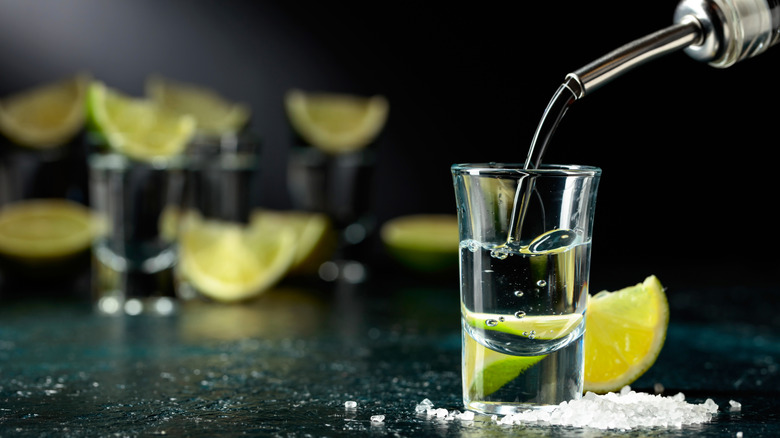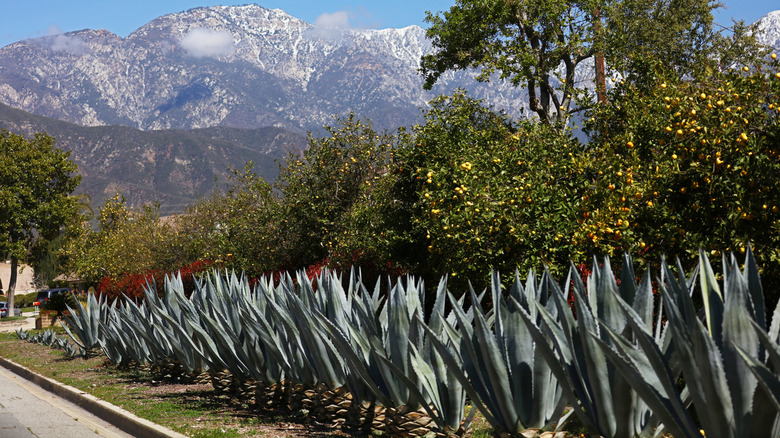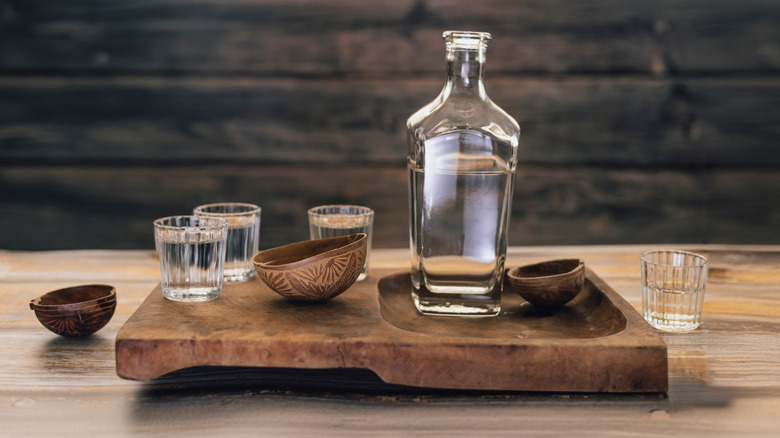Only Mexico Can Legally Make Tequila — But Here's What The US Can Make Instead
Especially over the last few decades, tequila has cemented its status in bars worldwide; bottles of the spirit grace shelves amidst vodka, whiskey, and other widespread offerings. As a result, it's easy to assume that tequila comes of broad origins — simply a distillation of agave. However, it is actually among the most regulated liquors. Per Mexico's federal guidelines, only five of the country's regions can legally distill the spirit, with the Jalisco area especially famed.
Plus, tequila also comes with many further specificities like an exclusively blue Weber agave composition, a small allowance for additives, a resultant proof range, as well as aging regulations for different expressions. There's also a rigid sugar standard that all tequilas must follow. Overseen by the Consejo Regulador del Tequila since 1994, the organization inspects every stage of tequila manufacturing, securing bottles with a sticker to back authenticity. So that's all to say, tequila's a tightly controlled moniker, and no other country can label their spirit with the name.
Nevertheless, there are still plenty of produced liquors that have a similar — if not nearly identical — composition. For one, there's the nuanced difference between tequila and mezcal, which is another widespread agave spirit. And even trickier examples include bottlings like Caballito Cerrero — a historic Jalisco-based tequila made from a different agave — that's disqualified from the label. Not to mention that tequila-resembling spirits have been distilled in the U.S. since 1936. So naturally, this raises the question: What is an American-made tequila?
Tequila-like liquor produced in the U.S. must be called an agave spirit
In Mexico, a Denomination of Origin applies to four types of agave spirits, including tequila. Production that doesn't entail certain spirit qualities, takes place in an uncertified region, or doesn't seek certification falls into a generalized term called destilado de agave (agave distillate). In fact, some producers even purposefully seek this label for more freedom in their production. And the U.S Alcohol and Tobacco Tax and Trade Bureau recognizes and regulates the category, referring to such bottles as agave spirits.
Precisely in this category fall tequila-like distillates crafted in the United States. While not as expansive as the Mexican market, there are a multitude of producers operating under such a label. For instance, Ventura Spirits produces Tecolotito with California-grown blue agave, yielding a liquor of pleasant complexity.
Meanwhile, State 38 Distilling, based in Golden, Colorado, crafts aged varieties of Añejo and Reposado in addition to the Blanco style, using blue agave certified as organic. They buy their agave directly from Mexico, but then proceed with a fully in-house production. The liquor is distilled via a copper hybrid still, a technique commonly used for tequila. However, as the spirit falls out of tequila regulation, there are innovative flourishes like the blending of agave syrups during production.
So really, how much the agave spirit tastes like Mexican tequila is up to each American producer. And since tequila's terroir translates through the flavor, a spirit made in the U.S. will intrinsically taste different than its Mexican counterpart.
Tequila-like agave spirits present new flavor options
Such an expansion of tequila-like spirits opens doors to exciting new possibilities. Since flavor is impact by factors like the type of yeast, location of fermentation, and the source of agave plants and barrels used , American-made agave spirits intrigue with new flavor possibilities.
For instance, brands like Ameragave age agave spirits in innovative ways, using only completely new American oak barrels — a technique nonexistent in Mexico. Meanwhile, Waikulu distillery, based in Hawaii, employs blue agave grown on the island, thereby imbuing the spirit with unique floral notes.
And in California, agave growing conditions are more similar to those in Mexico, sparking many unique small-batch agave spirits. As the cultivation of blue Weber agave is long and arduous, some of these producers reach for wild agave types instead, blending them in unorthodox ways. Certain processes — like the harvesting process — borrow from tequila-making, while the minutiae of distilling stray from the norm, mirroring the broad nature of agave spirits in Mexico. Not quite tequila or mezcal, this opens to an uniquely American class of liquor. Free of the tequila moniker, the sipping flavors enchant in new ways.


